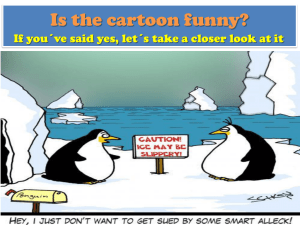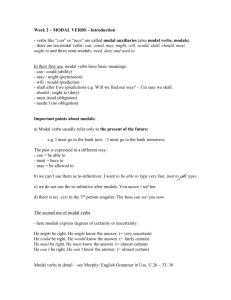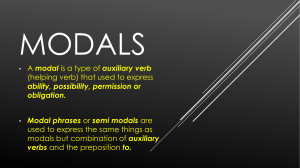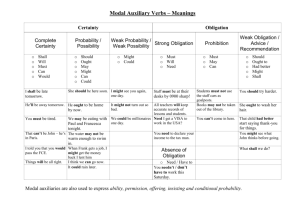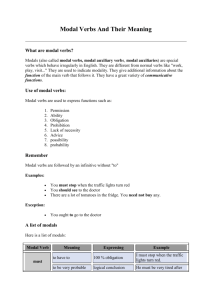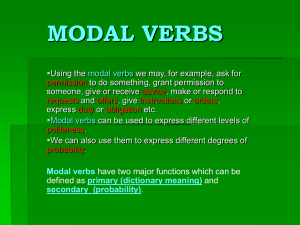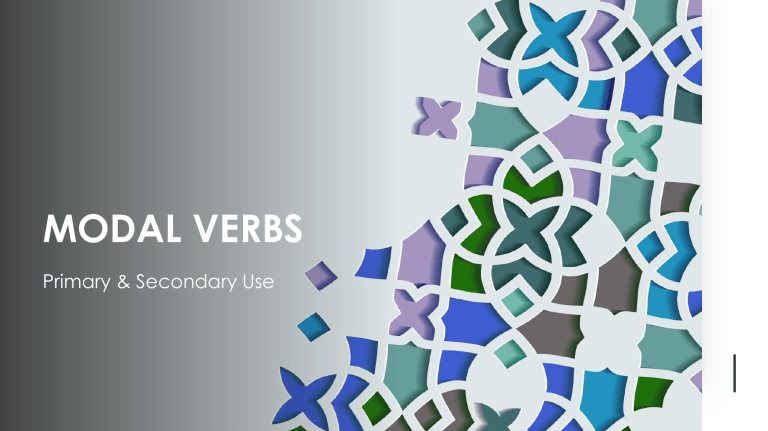
MODAL VERBS Primary & Secondary Use MODAL VERBS Using the modal verbs we may, for example, ask for permission to do something, grant permission to someone, give or receive advice, make or respond to requests and offers, give instructions or orders, express duty or obligation etc. Modal verbs can be used to express different levels of politeness. We can also use them to express different degrees of probability. Modal verbs have two major functions which can be defined as primary (dictionary meaning) and secondary (probability). PRIMARY FUNCTIONS OF MODAL VERBS Ability Permission Prohibition Prediction Duty (escapable obligation) Obligation (inescapable) Request; Offer Possibility Absence of obligation CAN MAY (Might)/ CAN (Could) MUSTN’T / CANNOT WILL / SHALL / MAY SHOULD MUST / OUGHT TO CAN (Could) / WILL (Would) CAN / CANNOT NEEDN’T 1. I CAN play the piano I CAN'T rap. 2. Mom, MAY / MIGHT I go out with my friends tonight? Ability Permission 3. Dad, CAN / COULD you lend me some money for the movies tonight? 4. You MUSN'T text while driving, you COULD have an accident They CANNOT do that, it's illegal! 5. Pochita, WILL / MAY / SHALL I win the Tinka any time soon? 6. You SHOULD do some household chores, don't you think? 7. You MUST / OUGHT TO pay your taxes, otherwise SUNAT WILL charge you an astronomical amount of money 8. CAN I have a glass of water, please? 9. WILL / WOULD you do us the honour to join us for dinner? 10. They CAN'T be at home now, they are supposed to be on their way here! 11. Some scientist say some people WILL become immune to COVID-19 once they have had it. 12. You NEEDN'T have bothered, you really shouldn't have, we have plenty of food here, but that is very kind of you, thanks. Prohibition Prediction Duty Obligation Request Offer Possibility Absence of Obligation SECONDARY FUNCTIONS OF MODAL VERBS In their secondary function, the modal verbs (except shall) can be used to express the degree of certainty/uncertainty or probability. ALMOST CERTAIN MUST WILL / WOULD OUGHT TO SHOULD CAN / COULD MAY / MIGHT CAN’T VERY UNCERTAIN LEVELS OF CERTAINTY / UNCERTAINTY 1. Some congress people MUST have made a complot against Vizcarra. 2. I think a big earthquake in Lima WILL / WOULD happen eventually. 3. Incas OUGHT TO have inspired from nature in order to build their huacas, otherwise, how do you express all the symbols and rituals? 4. Maybe Alan Garcia knew what was going to happen to him, I guess, someone SHOULD have suggested it to him, or else, how do you explain his erratic behaviour days prior to his suicide? 5. I think the president of Brazil CAN / COULD have hired someone to stave him and use it in his favour in order to gain popularity for his presidency. Who knows, politics nowadays are crazy. 6. Who knows, may Aliens MAY / MIGHT have built the pyramids in Egypt, right? SOME IMPORTANT GRAMMAR ASPECTS The negative is formed by the addition of not after the modal. In informal spoken English not is often reduced to n’t. Modals in affirmative do not have contracted forms (except for will and would: I’ll, I’d). In questions, the modal verbs behave like the auxiliar verbs: do, have or be. Only one modal verb can be used in a single verb phrase. Tenses: all modals can refer to the immediate present or the future, therefore ‘present’ is not always a reliable label ( I can call him today / I can call him tomorrow). There is no progressive form for modals. But we can put the verb that follows the modal into the progressive form (-ing). Verbs that share some characteristics with the modals: be able/ have to / ought to / need CHECK OUT THESE EXAMPLES AND ANALYSE THEM I can lift 25 kg. She can speak French. I couldn’t finish the job. You can go now. It can be quite cold in winter. He can’t be at home. He could have left last night. May I borrow your umbrella, please? You must do it. I had to do it. I’ll have to do it. We mustn’t forget our passports. You must have seen him. It must be Anna calling. You needn’t wait for me. The exam can’t have been difficult if he passed without studying. She should be at home by now. Shall I open the window? PAST TENSE OF MODALS When the sentence refers to the primary meaning(can: ability/permission, must: obligation) the past form is expressed mainly by : Can: could / was(were) able or was(were) allowed Must: had to / was(were) obliged to When the sentence refers to the secondary meaning (can: possibility/probability (or sth that could have happened but didn’t happen), must: certainty) the past form is mainly expressed by: Can: could + have + past participle Must: must + have + past participle

